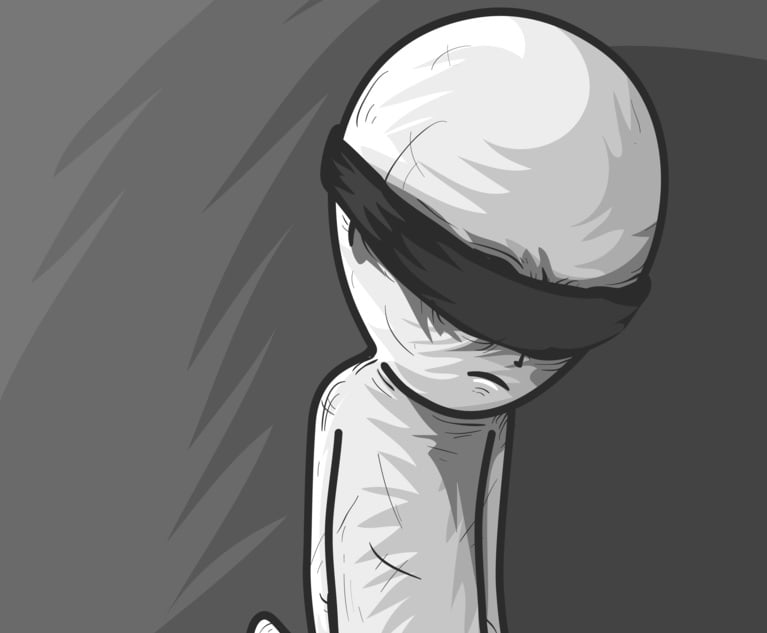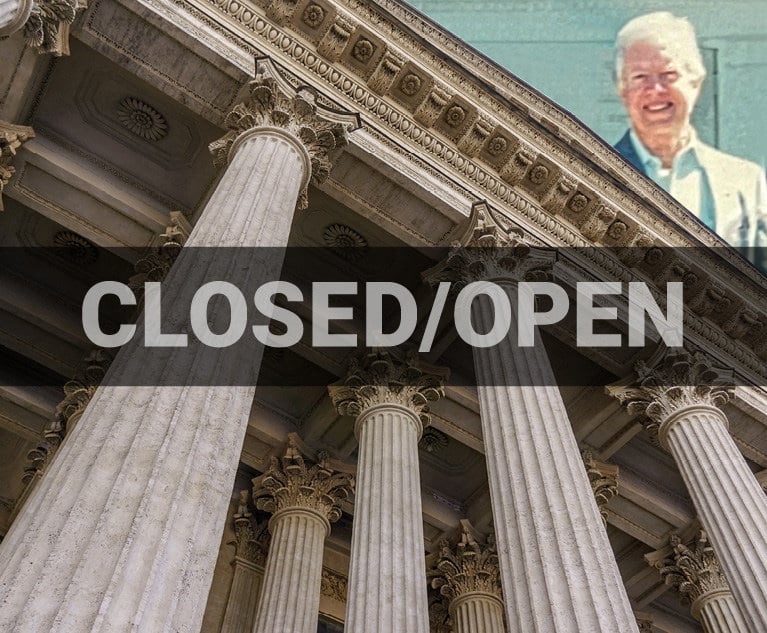Roy Black, 79, Taught Me About ChatGPT and 'Jury Magic'
If people wonder whether a senior attorney can adapt to technology, Black is a trailblazer for his generation and maybe even those years younger.
October 14, 2024 at 05:52 AM
7 minute read
Read Related: Might As Well Have Artificial Intelligence: Roy Black is Bothered by this Courtroom Trend
I consider myself a fairly well-read and educated person who is up to speed on almost all the new trends. Almost. In the interview, Black discussed the importance of ChatGPT and its role in the future of legal practice. I did not know what ChatGPT was. I had to Google it. Others in the newsroom were just as perplexed. Well, our tech guy knew and brought us up to speed. If people wonder whether a senior attorney can still contribute meaningfully, or more importantly, adapt to technology rather than resist it, Black is a trailblazer for his generation and maybe even those years younger. His vision two years ago became a reality as generative artificial intelligence is now the cornerstone of nearly every law firm in the country. From that day, I paid attention to Black, and soon learned of the high regard he seems to command in legal circles.
Read the Series: Elder Litigators Confront Tough Questions in Last Act of Careers
Where It Started
Black always had an eye for fairness, justice and perhaps things to come. "When I was 14 or 15, I was living in Connecticut. We ended up moving to Kingston, Jamaica, because my stepfather was British, and I had to go to an English prep school in Jamaica," he said. He recalls how a math professor treated the young student harshly as a foreigner, and the experience left Black with a new purpose. "From that, I became a real hatred of petty authority, about people who were taking advantage of others because of their position in life and what have you. And that motivated me to go to law school, because I wanted to do something about that," he said. Over over his 55-year career, Black has honed a reputation by representing high-net-worth and high-profile clients, including Rush Limbaugh, Kelsey Grammer, Peter Max, Indy race car driver Helio Castroneves, and William Kennedy Smith.
'More Proud of This'
You would think with the long list of celebrity clients, Black would recall one of those cases as his "favorite child." But for that, the attorney went back to 1971 when he came upon a husband and pregnant wife seated for hours on a Dade County courthouse bench. The man was there to turn himself in to serve a five-year jail term. "In those days, people surrendered in open court, and the prison guards would put them in the Dade County Jail, and the man said, 'I've been here since eight o'clock in the morning, and I keep going up to them to try to surrender, and every time they tell me they're too busy and just wait,'" Black recalls. In the absence of the man's attorney, Black went before the judge. "I said, 'What better evidence is there of somebody's rehabilitation [than] to spend all day here with his pregnant wife, trying to surrender to serve a prison sentence? That's far more impressive than somebody serving five years in prison.'" After Black's argument, the judge vacated the sentence and gave probation, rather than a prison sentence. "I will tell you I was more proud of this than any of my highly publicized trial victories, because it allowed me to find my purpose for being a lawyer," Black said.
'He Was Already a Star'
The accolades piled on during his career, but some who know him always saw a spark in Black. "I started working in the [Dade County] Public Defender's Office in April of 1971, and Roy was already working there. He was already a star," said former Dade County Public Defender Bennett H. Brummer. "I know he had a very good academic background before he took the bar. He's always been known to be very bright and very talented, but his key to success is that he's very hardworking." Former Public Defender, chief appellate court judge, and criminal defense attorney Phillip A. Hubbart saw it too. "I have always believed that a trial lawyer during his or her career either gets better as the years go by or gets worse, but never stays the same," Hubbart said. "Roy has always lived by that principle, which is the key to his success." Black was a former student of Bennett, who taught criminal trial practice as an adjunct professor at the University of Miami Law School. Black also worked for Bennett as a lawyer in the Public Defender Office for Dade County from 1971 to 1976. "He constantly challenges himself to get better with every case he tries," Bennett said. "He never rests on his laurels or gets stale. He is very smart and an avid reader. He keeps up on the law in his specialty, which is forever changing." Bennet said Black remains open to new ideas to improve his trial presentation, whether it be an opening statement, cross-examination, final argument, pretrial practice, motions to dismiss, motions to suppress, depositions, or investigative work. "He works hard to develop evidence and reasonable inferences from evidence that support a powerfully persuasive position to argue to the jury; so essential to winning cases," Bennet said. "He is also a highly professional and ethical lawyer who is universally respected by judges and lawyers alike. His word is his bond."
'Carry the Agonizing Concern of the Clients'
Kendall Coffey, former U.S. attorney in the Southern District of Florida from 1993-1996, is named partner at Miami's Coffey Burlington. He and Black have known each other for decades. "I'm not going to add to the plethora of kudos about what a great trial lawyer is his and his 'jury magic,' but I've also seen him on both sides, from a prosecution perspective, as well as the co-counsel perspective on plea negotiations," Coffey said. Plea deal negotiations is an art form in which Coffey thinks Black excels. "I was struck by the fact that he approached that very, very strategically, just as meticulously as he would be in a closing argument," Coffey said. "He was, and I'm sure still is, singularly effective, not just because of who he is, but the level of detail and preparation and strategizing and planning ... that's a very big deal for the great defense lawyers." Coffey said he has looked Black in the eye during trial and witnessed an air of compassion that resonates with him. "Even the best, the very best, such as Roy Black, they're not going to win every case, or they're going to have to plea out a client in some cases. It's an occupational hazard, developing a sense of isolation or detachment because how much do you want to personalize the agonizing ordeal that a client goes through in a criminal case? They're almost never happy endings," Coffey said. "I don't think he telegraphs how much he cares—and there are probably professional reasons why you don't want to openly, or why you're cautious about it—but he deeply cares. And I've seen him in the middle of cases or even key points in cases, and you can see in his eyes how much he cares, how much he's worried because outcomes are never a given. He does indeed carry the agonizing concern of the clients with him."
NOT FOR REPRINT
© 2025 ALM Global, LLC, All Rights Reserved. Request academic re-use from www.copyright.com. All other uses, submit a request to [email protected]. For more information visit Asset & Logo Licensing.
You Might Like
View All
'I've Seen Terrible Things': Lawyer Predicts Spike in Hazing Suits

Financially Grounded: South Florida-Based Silver Airways Files for Bankruptcy

Law Firms Mentioned
Trending Stories
- 1'Not the President's Personal Lawyer': Lawyers Share Concerns Over How AG Pick Bondi’s Loyalism to Trump May Impact DOJ
- 2US Judge OKs Partial Release of Ex-Special Counsel's Final Report in Election Case
- 3The Demise of Truth and Transparency in Federal Sentencing
- 4Former Phila. Solicitor Sozi Tulante Rejoins Dechert
- 5'I've Seen Terrible Things': Lawyer Predicts Spike in Hazing Suits
Who Got The Work
Michael G. Bongiorno, Andrew Scott Dulberg and Elizabeth E. Driscoll from Wilmer Cutler Pickering Hale and Dorr have stepped in to represent Symbotic Inc., an A.I.-enabled technology platform that focuses on increasing supply chain efficiency, and other defendants in a pending shareholder derivative lawsuit. The case, filed Oct. 2 in Massachusetts District Court by the Brown Law Firm on behalf of Stephen Austen, accuses certain officers and directors of misleading investors in regard to Symbotic's potential for margin growth by failing to disclose that the company was not equipped to timely deploy its systems or manage expenses through project delays. The case, assigned to U.S. District Judge Nathaniel M. Gorton, is 1:24-cv-12522, Austen v. Cohen et al.
Who Got The Work
Edmund Polubinski and Marie Killmond of Davis Polk & Wardwell have entered appearances for data platform software development company MongoDB and other defendants in a pending shareholder derivative lawsuit. The action, filed Oct. 7 in New York Southern District Court by the Brown Law Firm, accuses the company's directors and/or officers of falsely expressing confidence in the company’s restructuring of its sales incentive plan and downplaying the severity of decreases in its upfront commitments. The case is 1:24-cv-07594, Roy v. Ittycheria et al.
Who Got The Work
Amy O. Bruchs and Kurt F. Ellison of Michael Best & Friedrich have entered appearances for Epic Systems Corp. in a pending employment discrimination lawsuit. The suit was filed Sept. 7 in Wisconsin Western District Court by Levine Eisberner LLC and Siri & Glimstad on behalf of a project manager who claims that he was wrongfully terminated after applying for a religious exemption to the defendant's COVID-19 vaccine mandate. The case, assigned to U.S. Magistrate Judge Anita Marie Boor, is 3:24-cv-00630, Secker, Nathan v. Epic Systems Corporation.
Who Got The Work
David X. Sullivan, Thomas J. Finn and Gregory A. Hall from McCarter & English have entered appearances for Sunrun Installation Services in a pending civil rights lawsuit. The complaint was filed Sept. 4 in Connecticut District Court by attorney Robert M. Berke on behalf of former employee George Edward Steins, who was arrested and charged with employing an unregistered home improvement salesperson. The complaint alleges that had Sunrun informed the Connecticut Department of Consumer Protection that the plaintiff's employment had ended in 2017 and that he no longer held Sunrun's home improvement contractor license, he would not have been hit with charges, which were dismissed in May 2024. The case, assigned to U.S. District Judge Jeffrey A. Meyer, is 3:24-cv-01423, Steins v. Sunrun, Inc. et al.
Who Got The Work
Greenberg Traurig shareholder Joshua L. Raskin has entered an appearance for boohoo.com UK Ltd. in a pending patent infringement lawsuit. The suit, filed Sept. 3 in Texas Eastern District Court by Rozier Hardt McDonough on behalf of Alto Dynamics, asserts five patents related to an online shopping platform. The case, assigned to U.S. District Judge Rodney Gilstrap, is 2:24-cv-00719, Alto Dynamics, LLC v. boohoo.com UK Limited.
Featured Firms
Law Offices of Gary Martin Hays & Associates, P.C.
(470) 294-1674
Law Offices of Mark E. Salomone
(857) 444-6468
Smith & Hassler
(713) 739-1250







